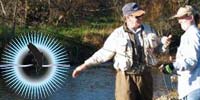Healing Waters- Sgt Diane Cochran

 4:19
Barrett Golding
4:19
Barrett Golding
Wounded warriers get their wheelchairs wet fly-fishing.
Broadcast: Mar 22 2007 on NPR Day to DaySeries: Project Healing Waters Subjects: War, Environment, Health
An Injured Sergeant Goes with Life's Flow
March 22, 2007 from Day to Day
JOHN YDSTIE, host: Army Sergeant Eva Diane Cochran has been living in a hospital for almost three years. Cochran was severely injured in Afghanistan, and she spends a lot of time doing occupational and physical therapy. But she also gets to do another type of therapy that’s a lot a more enjoyable. She goes fly-fishing with a group called Project Healing Waters. It’s therapy for the body and mind.
As part of our series this week, we caught up with Sergeant Cochran and a volunteer guide while fishing in Virginia. (Soundbite of boat motor) Unidentified Man: That’s really a very beautiful fish. Sergeant EVA DIANE COCHRAN (U.S. Army; Afghanistan War Veteran): Beautiful rainbow - beautiful color. It’s just like dancing with them, bringing them in. I just love it. Absolutely awesome. Any day you get near some water, get near the river is a good day. Unidentified Man: (Unintelligible) Sgt. COCHRAN: I’m Sergeant First Class Eva Diane Cochran. I was injured in Kandahar, Afghanistan in 2004. I was in a Humvee, you know. We rolled – I was told it was five times down in a ravine, but I don’t I remember it. (Soundbite of laughter) Sgt. COCHRAN: You know, adrenaline starts flowing, and you just want to keep on doing your mission and taking care of your soldiers. And I just kept saying I’m okay, I’m okay, and I wasn’t okay. I had spinal injuries, and I had some fractures on my lower spine. I have a fused vertebrae in my neck and in my lower spine. You know, I had a lot of herniated discs and hand fractures. Unidentified Man: Let’s try it again here. Sgt. COCHRAN: And on a good day, when all my nerves are acting right, talking to my muscles real good, I can walk most of the day. Just - I have to stop and rest. And a lot of times my back will start spasming, or my nerves down my right leg won’t work right. And then I will kind of lose the use of this leg and coordination, and then I’ll fall. So I have a cane, and this is an improvement. This time last year, I was on two crutches, and now, I’m allowed to just have one cane. So… Unidentified Man: Okay, girl, it’s all yours. Sgt. COCHRAN: Okay, I’ll see what I can do. Unidentified Man: Hey! Sgt. COCHRAN: Nope. You’re thinking about it, you’re thinking about it - and I don’t see him. Do you? (Soundbite of laughter) Unidentified Man: He took it once. Unidentified Man: There he is. He’s going up, yeah. Sgt. COCHRAN: There he is. Drag it, drag it, drag it. Well, he thought about it. I enlisted in the Army when I was 17, and that was a number of years ago. I think a lot of people think it’s about going out and shooting people. And that’s not what the military is about. It’s not what it’s about at all. America is just a great nation, and part of being a great nation is the responsibility to help those who can’t help themselves. And it’s not, you know, soldiers don’t want war, but they train for it. And they don’t run from it. And the Army has been very good to me. I’ve been in for almost 26 years now. I’ve done amazing things. You know, I’ve flown to countries most people only dream about. You know, I get paid to skydive out of a Black Hawk helicopter. It’s just been a great life for me. And I, my life is changed now. And it’s going to be different forever now, but I don’t resent that. And a lot of people have asked me that, well, do you have any animosity since your injuries? And I don’t. It’s just a different phase of my life, and, you know, God has a great plan for me. And I’m not sure what it is right now, but I’m going to find out. I’m looking forward to the next step. Unidentified Man: Okay, we’re going to go find some better fishing grounds. Sgt. COCHRAN: Okay. Unidentified Man: Let me give you a (unintelligible). Okay. (Soundbite of music) YDSTIE: Sergeant Eva Diane Cochran’s story and all the stories in our series on Project Healing Waters are produced by Barrett Golding of hearingvoices.com. To hear the rest of the series, go to our Web site, npr.org.
